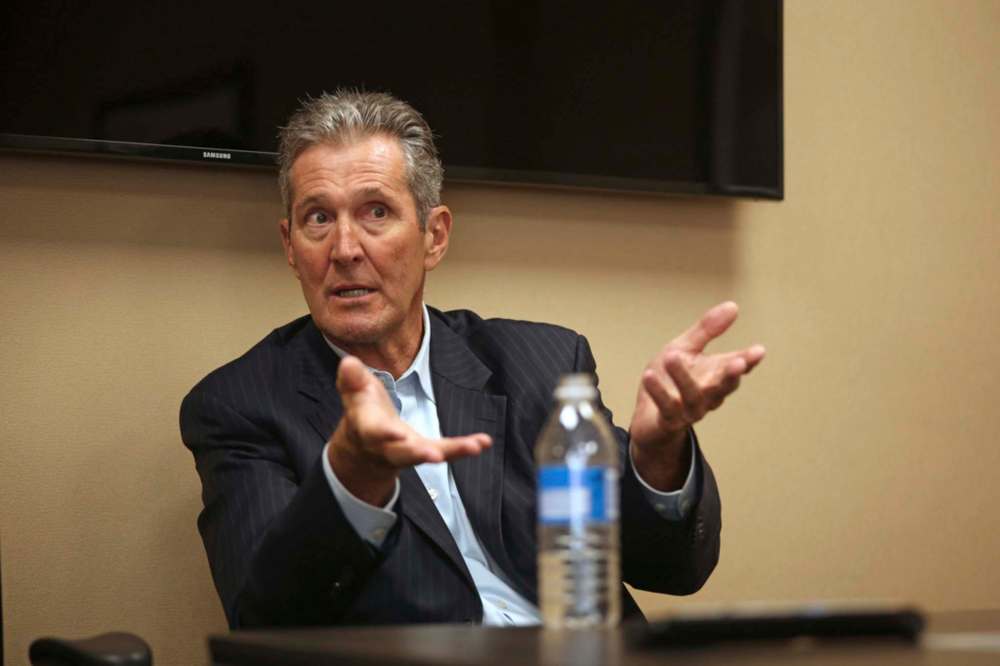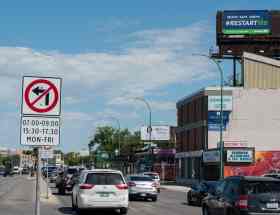Pallister dips into shark-filled waters
Read this article for free:
or
Already have an account? Log in here »
To continue reading, please subscribe:
Monthly Digital Subscription
$0 for the first 4 weeks*
- Enjoy unlimited reading on winnipegfreepress.com
- Read the E-Edition, our digital replica newspaper
- Access News Break, our award-winning app
- Play interactive puzzles
*No charge for 4 weeks then price increases to the regular rate of $19.00 plus GST every four weeks. Offer available to new and qualified returning subscribers only. Cancel any time.
Monthly Digital Subscription
$4.75/week*
- Enjoy unlimited reading on winnipegfreepress.com
- Read the E-Edition, our digital replica newspaper
- Access News Break, our award-winning app
- Play interactive puzzles
*Billed as $19 plus GST every four weeks. Cancel any time.
To continue reading, please subscribe:
Add Free Press access to your Brandon Sun subscription for only an additional
$1 for the first 4 weeks*
*Your next subscription payment will increase by $1.00 and you will be charged $16.99 plus GST for four weeks. After four weeks, your payment will increase to $23.99 plus GST every four weeks.
Read unlimited articles for free today:
or
Already have an account? Log in here »
Hey there, time traveller!
This article was published 12/08/2020 (1952 days ago), so information in it may no longer be current.
Is Premier Brian Pallister having his Larry Vaughn moment?
Cinephiles know Vaughn was the mayor of the fictional town of Amity, an island community that served as the setting for Steven Spielberg’s 1975 classic film, Jaws. Vaughn spends the first half of the film ignoring the concerns of police chief Martin Brody, who is convinced an enormous Great White shark has descended upon the idyllic tourist trap.
Vaughn won’t, or perhaps can’t, believe the shark is real, largely because of what it would mean to the local economy. “I’m only trying to say that Amity is a summer town,” Vaughn tells the chief. “We need summer dollars.”

Nearly a half-century after his name was carved into the annals of American pop culture, Larry Vaughn has made a comeback as a meme used to attack political leaders who delayed or demurred their response to the COVID-19 pandemic.
United States President Donald Trump, British Prime Minister Boris Johnson, and a host of lesser-knowns have been sarcastically likened to the fictional Amity mayor.
Now, the Manitoba premier appears to be adding his name to the list.
Addressing reporters Wednesday in Brandon, where his PC caucus and cabinet have come for meetings, Pallister employed classic Vaughnian rationale to dismiss calls for more economic and social restrictions in the Wheat City, which is the scene of a significant COVID-19 outbreak. And to justify his decision to spend $250,000 on a public awareness campaign to encourage Manitobans to restart the provincial economy.
#RestartMB — featuring the slogan “ready, safe, grow” — is already appearing on billboards, TV and social media. The wisdom of launching a public campaign of this kind — at this time, in this place — is yet another deafening example of the premier’s growing tone deafness.
It is not the kind of information Manitobans need now. The Brandon outbreak and increasing cases in other areas of Manitoba are pretty clear evidence some people are starting to stray from best public health practices. Ten new cases in Winnipeg reported Wednesday have been traced to “travel and close contacts” — yet another example of returning travellers not isolating adequately.
Faced with much bigger, more pressing needs, it’s a questionable use of public money. This is, after all, a government that has drastically underspent on most of its economic support programs and failed to loosen eligibility or change focus to help get more money into the hands of financially-strapped individuals and businesses.
Ask the average small businessperson in Manitoba — most of whom have been begging the Pallister government for funds to help pay for protective equipment needed for reopening — what they think of $250,000 squandered on billboards. It’s not going out on much of a limb to say this expenditure will be extremely unpopular.
Remarkably, there was some evidence Pallister came to the same conclusions about the inherent flaws in the timing of #RestartMB around about the time he walked in front of the microphone to address reporters in Brandon.
The premier looked decidedly sheepish when asked about the wisdom of launching a campaign encouraging Manitobans to re-engage with the economy in a city starting to lock itself down until the current outbreak is controlled.
Pallister’s attempt to pivot the story was short on enthusiasm, but long on intellectual dishonesty.
The premier claimed #RestartMB was actually a “health and wellness” campaign designed to remind Manitobans to continue social distancing, practicing hand hygiene and isolating if they feel sick. “A major part of this ad campaign is to make sure we’re educating and reminding people of the fundamentals.”
It can be reported, after several scans of the news conference recording on YouTube, the premier kept a straight face as he uttered that tortured rationalization.
#RestartMB does mention the word “safe,” but it does not contain any other direct or indirect message about public health measures. This is a “get out there and start spending your money” campaign — a message on a collision course with the better instincts of Manitobans.
This is the same premier who tried to drop an aggressive Phase 4 reopening plan on the province, only to have it swatted away by tens of thousands of Manitobans who knew it was too much, too soon. Clearly, there were no lessons learned.
Increasingly, we are seeing a strong disconnect between Manitoba’s response and the best practices in other jurisdictions that have fought off a much bigger COVID-19 presence.
The most striking example of this disconnect can be seen in New Zealand. Prime Minister Jacinda Ardern this week invoked a three-day stay-at-home order for the city of Auckland. Her decision came when, after more than 100 days without community transmission, four new cases were registered.
Ardern’s strategy largely reflects an inescapable reality of pandemics: if you wait until the number of infections is large to lock everyone down, you’ve not only waited too long, when all is said and done, you’ll be inextricably linked to one of the most infamous dithering politicians of all time.
dan.lett@freepress.mb.ca

Born and raised in and around Toronto, Dan Lett came to Winnipeg in 1986, less than a year out of journalism school with a lifelong dream to be a newspaper reporter.
Our newsroom depends on a growing audience of readers to power our journalism. If you are not a paid reader, please consider becoming a subscriber.
Our newsroom depends on its audience of readers to power our journalism. Thank you for your support.
History
Updated on Thursday, August 13, 2020 8:20 AM CDT: Corrects typo










